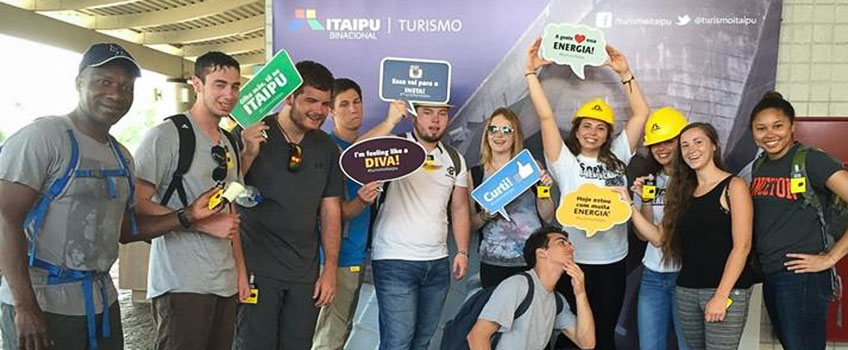Home » Posts tagged 'study abroad'
Tag Archives: study abroad
AFS USA is educating the world

Global collaboration in the classroom is one of the most useful tools teachers can utilize. Through AFS’ USA program, high schools can host exchange students and send their own students abroad, creating a cultural exchange of learning. Studying abroad early (in high school) makes you a well-rounded individual. In AFS’ mission statement, they make it clear that they are all about immersing students in other cultures, exposing them to different ideas, educational methods, and other ways of life. Immersion allows students to bridge cultural gaps, and when that happens, there is more understanding and acceptance.
AFS also provides educators with COVID-19 resources, to ensure that global education continues during unforeseen events.
If you are a teacher and use AFS to sponsor an exchange student from a foreign country, the program offers a variety of tools and resources to provide students with the best possible educational experience to bridge cultural gaps. For example, I would have students listen to their podcast called the AFS Exchange so they can interact with AF and learn the value of studying abroad before they make a decision. The podcast provides full-length episodes on life abroad, with each episode dedicated to being a student in different countries to provide students with a variety of options when choosing their exchange program. Not only are there episodes with titles like “Advice From Us to You” and “Egypt, Iceland, and How It All Began”, but there are episodes with members of the AFS program who are both exchange students and educators who host foreign students from countries around the world. They share their insights, advice, and global education tools so others can broaden their horizons.
The blog is another beneficial resource, which features a variety of guides for each country, as well as resources related to important current events like the guide for “AFS-USA Anti-Racism Resources Guide” and the guide for “Global Sustainability/Sostenibilidad Global in Oconomowoc, Wisconsin” that allows science and Spanish teachers to collaborate. Science and learning the Spanish language? Who would have thought those two subjects can complement each other? That’s one of the best parts about AFS; they help bridge not just cultural gaps but allow different subjects to complement each other in ways educators and students alike couldn’t have imagine before.
Their Global Educator Newsletter is another resource that provides students and teachers with all the information they need to know about AFS’ study abroad programs, including their virtual study abroad programs which allow you to “explore the world from home”. This was especially handy during COVID-19 when lockdowns prevented many from achieving their study-abroad goals; it kept the world connected through their computers.
With their mission statement that values immersion, promoting diversity is a major aspect of the program. It is what drives their dedication to educate the world through a shared program that links values from different backgrounds, beliefs, and identities. When teachers are able to share these resources with their students, even in a virtual setting from the classroom itself, we are on the path to a better world with more empathy and acceptance of our differences.
Global education will make the world a better place
Global education has never been more important. For millions of students, personal and professional goals are closely woven into how connected the world is. At Stockton University alone, the Office of Global Engagement is partnered with dozens of schools throughout the world. The fact that Stockton is one of the hundreds of universities throughout the country that are partnered with organizations like IES Abroad and EF exemplifies the widely recognized importance of connecting young academics with other countries.

Since the pandemic, UNESCO established the Global Education Coalition, which is “a platform for collaboration and exchange to protect the right to education during this unprecedented disruption and beyond”, and focuses on maintaining global collaboration when the world can’t travel. 175 UN member states are part of the coalition, further symbolizing the way the world recognizes the importance of global interconnectivity when it comes to education. During the pandemic, maintaining global collaboration through education was, as we all know, virtual. IES Abroad still ran their programs but through online internships, which allowed students to meet professors and other academics from their host schools abroad.
Interweaving academics and the world ensures that students are exposed to learning from a variety of viewpoints, backgrounds, and beliefs. This allows for empathy and open-mindedness, especially when a student is immersed in a country or school and is thus provided with the first-hand experience of what that culture is like. The COVID-19 pandemic made this come to a screeching halt, but it still didn’t stop people from studying abroad the moment international borders reopened in early 2021 thanks to COVID-tested flights and high vaccination rates in countries like Israel and Uruguay.
For people like Nia Donfris from Madrid’s San Louis University, the pandemic hurled a set of challenges in front of her dream of studying abroad, but she still didn’t let it stop her. This resilience is important to note. Donfris is in the nursing field, which forces her to forge close relationships with people, so learning another language and culture is important for empathy. This is important for so many other career fields, and when a different culture is understood through first-hand experience, company productivity, employee contentment, and community outreach can be achieved at the highest capacity.
Creating a better world with these things starts with education, and when education is connected on a global scale (whether through virtual events or physically studying abroad), the quality of education, graduates, and professionals is enhanced.
Recent Comments